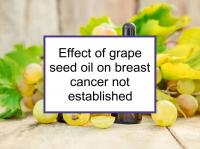Grape seeds contain resveratrol, cinnamic acid, gallic acid and anthocyanins, which have been shown to reduce breast cancer cell growth, proliferation and migration. However, these compounds are not significantly present in grape seed oil (although cold-pressed virgin grape seed oil contains more of them than highly refined products).
Grape seed oil primarily consists of the omega-6 fatty acid linoleic acid (approximately 71%, depending on grape variety), followed by oleic acid (17%) and palmitic acid (8%). Grape seed oil contains remarkably high levels of tannins compared to other seed oils. Grape seed oil also contains gamma-tocotrienol, a form of vitamin E with chemopreventive properties. The press residues of grape seed oil production are a far richer source than grape seed oil of polyphenols with strong antioxidant activity. These are also abundant in red grapes, purple grape juice, and red wine.
Breast cancer-related effects of consuming grape seed oil
No population studies are available that specifically investigated associations between grape seed oil consumption and risk of breast cancer. There is evidence from experiments using either carcinogen-induced or transplanted animal mammary tumor models, as well as in vitro studies, which demonstrate that linoleic acid, the primary fatty acid in grape seed oil, promotes mammary tumor development. Generally speaking, this effect has not been verified by human studies. However, one 2008 study found that women with a specific genotype (ALOX5AP −4900 A > G polymorphism) who consumed a significant amount of linoleic acid in their diets had an increased risk of breast cancer.
Grape seed compound gallic acid has been shown to increase the effectiveness of paclitaxel chemotherapy in hormone receptor positive (ER+/PR+) breast cancer cells.
Grape seed oil is a good source of the gamma-tocotrienol form of vitamin E, which has been shown to inhibit important steps in the metastasis of both ER+/PR+ and triple negative (ER-/PR-/HER2-) breast cancer cells. Gamma-tocotrienol has also been found to enhance the toxic effects of doxorubicin in ER+/PR+ breast cancer cells. In addition, gamma-tocotrienol has been shown to reverse multi-drug resistance in ER+/PR+ breast cancer cells.
A note on grape seed extract
Grape seeds (typically seeds left over from the wine-making process) are also used to produce grape seed extract supplements. Grape seed anthocyanins have been shown to inhibit breast cancer cell proliferation and metastasis in mice. Grape seed extract has also been found to inhibit aromatase (the synthesis of estrogen from androgens) in breast cancer cells. In addition, several studies have found that grape seed extract may act synergistically with chemotherapy agents such as doxorubicin and docetaxel to inhibit the growth of and induce the death of estrogen receptor-negative (ER-) breast cancer cells. Another study found that defatted grape seed protected rat liver cells from oxidative damage induced by doxorubicin. A 2025 study reported that red grape seed extract had synergistic treatment effects when combined with doxorubicin in triple negative breast cancer cells. However, we do not recommend taking grape seed extract for purposes of preventing or treating breast cancer, primarily because safe and effective levels of supplementation have not been established.
Additional comments
As mentioned above, virgin grape seed oil is particularly prone to oxidation. One study ranked the tendency of various oils to retain stability in the following order from high to low: macadamia oil > rice bran oil = toasted sesame oil > avocado oil > almond oil > hazelnut oil > grape seed oil > walnut oil. Whether virgin or refined, grape seed oil should be stored in a cool, dark place and checked for freshness before use.
Below are links to recent studies concerning this food and its components. For a more complete list of studies, please click on grape seed oil.
